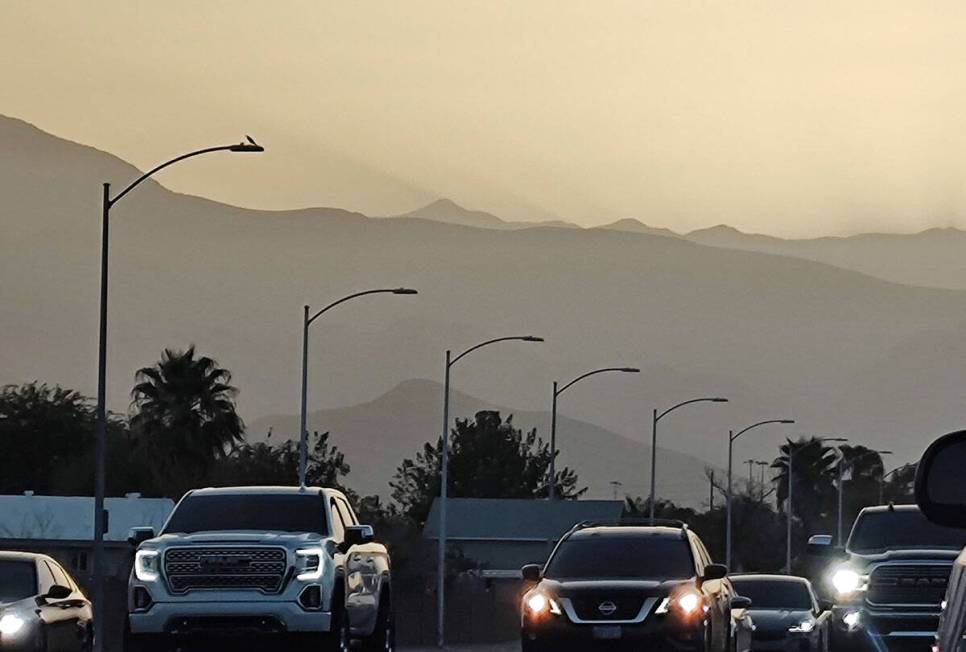Smoky skies improving over Las Vegas Valley

Sky conditions over the Las Vegas Valley were improving Friday afternoon, and were expected to get better come Saturday, the National Weather Service said.
Of the 15 Clark County monitoring stations that report particle and ozone pollution, nine showed “good” air quality shortly before 2 p.m. Friday while six were in the “moderate” category. None were showing unhealthy air qualities, which had been the case for most of the sites since Wednesday when Southern California fires and winds from the south-southwest created and sent smoke and some ashes to the valley.
“It’s better today and we will see some improvement Saturday from what we are seeing today,” said weather service meteorologist Brian Planz. “But so much of it depends on the fire behavior.”
Three major fires east of Los Angeles — the Bridge Fire, the Line Fire and the Airport Fire — have been sending smoke and ash into the air, and winds from the south-southwest have pushed the pollution toward the valley since Wednesday.
Overnight from Thursday into Friday, the nearly calm wind conditions were not helping to clear smoke, said the county air quality website, and was instead just “blowing the smoke around the valley.”
Planz said some smoke conditions were to be expected as long as the wind is predominantly from the south and southwest, but he said the smoke model showed more clearing Saturday and stronger winds on Sunday, improving conditions that much more.
Some progress reported
Helped by cooler temperatures, firefighters gained ground Friday against the three Southern California fires and authorities began scaling back evacuation orders that displaced thousands of people.
The largest is the Bridge Fire east of Los Angeles, which has burned 81 square miles, torched at least 33 homes and six cabins and forced the evacuation of 10,000 people. The cause of the fire was not yet known. After days of burning without fire crews being able to stop its forward march, it was 3 percent contained on Friday.
“Firefighters made great progress on the ground, aided by aircraft to attack the fire aggressively 24 hours per day,” the California Department of Forestry and Fire Protection said in a statement about the blaze.
While firefighters have made significant progress, the three major wildfires that have ravaged the mountains east of Los Angeles, destroying dozens of homes, injuring a dozen people, and burning more than 100,000 acres, still pose significant threats to some communities.
California is entering the height of wildfire season and has already seen nearly three times as much acreage burn as during all of 2023.
Evacuation orders were being scaled back, including in parts of Big Bear where the Line Fire forced thousands of people to flee after authorities say a delivery driver purposely started the blaze on Sept. 5.
The fire has charred 59 square miles in the San Bernardino mountains where Southern California residents ski in the winter and mountain bike in the summer. It was 21 percent contained as of Friday.
The Line Fire was burning through dense vegetation that grew after two back-to-back wet winters that included snowstorms that caused tree branches to break, leaving behind a lot of “dead and down fuel,” said Cal Fire Operations Section Chief Jed Gaines.
The Big Bear Zoo had to move all of its animals to a zoo in the city of Palm Desert to protect them from the wildfires and escalating temperatures, zoo officials said.
The Airport Fire, burning in Orange and Riverside counties, has burned more than 37 square miles. The fire, which was reportedly sparked by workers using heavy equipment, was 8 percent contained Friday morning.
The fires have threatened tens of thousands of homes and other structures across Southern California since they escalated during a triple-digit heat wave. Weekend forecasts called for temperatures that reached triple digits last weekend to drop to the 70s.
In northern Nevada, the worst danger appeared to have passed near Reno, where the Davis Fire forced 20,000 evacuations over the weekend. Most of the remaining evacuations were lifted for the blaze, which has burned nearly 9 square miles of timber and brush. Containment was estimated Friday at 56 percent.
Tips for limiting exposure
Wildfire smoke contains small particles and other pollutants that can aggravate respiratory diseases such as bronchitis and asthma or heart disease. The young and the elderly as well as those with upper respiratory issues are advised to limit their exposure to the outdoors.
— Stay indoors when you see or smell smoke.
— Keep windows and doors closed.
— Limit outdoor exertion on days with high levels of fine particles in the air. Exercise makes you breathe heavier and increases the amount of particulates you are likely to inhale.
— Consider changing your indoor air filters if they are dirty.
Contact Marvin Clemons at mclemons@reviewjournal.com. The Associated Press contributed to this report.